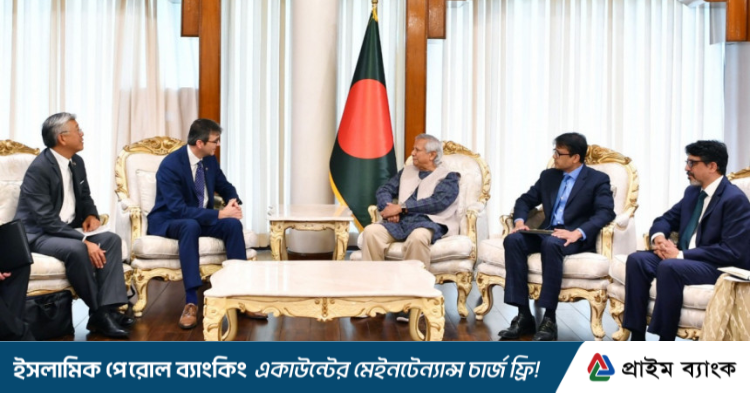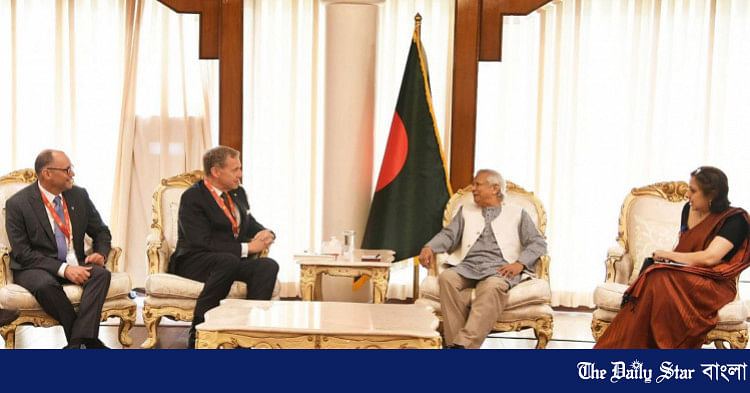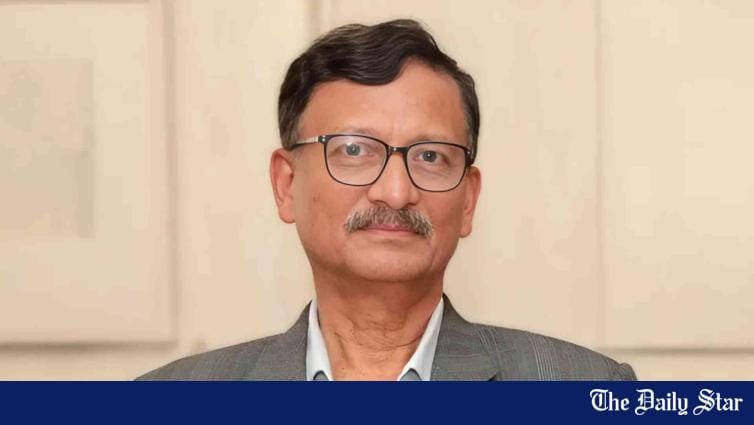Saif
Senior Member
- 13,746
- 7,411
- Origin

- Axis Group

- Copy to clipboard
- Thread starter
- #51
Washington to work closely with Dhaka
Washington will closely work with the interim government, especially regarding health, education, labour, governance, and the Rohingya issues, said US Embassy Charge D’Affaires in Dhaka Helen LaFave.
Washington to work closely with Dhaka
US envoy tells Yunus
Washington will closely work with the interim government, especially regarding health, education, labour, governance, and the Rohingya issues, said US Embassy Charge D'Affaires in Dhaka Helen LaFave.
She made the remarks while paying a courtesy call to Chief Adviser Prof Muhammad Yunus at the State Guest House Jamuna in Dhaka.
"The US government is happy to congratulate the chief adviser and is looking forward to working closely together," according to a statement of the US charge d'affaires.
She said Washington will support the interim government of Bangladesh and strengthen ties with Dhaka on a range of issues.
The US embassy in Dhaka will resume its consular service this week to expedite visa processing, she said, adding that thousands of Bangladeshi students now study in US universities.
The US has started resettling Rohingya to the US, and Helen LaFave hoped the process would be expedited.
The US is the largest contributor to the Rohingya humanitarian responses, and the amount of monthly food aid for the Rohingya has increased this year after more US funding, she said.
Yunus thanked the US for supporting Bangladesh, including its continued funding for more than one million Rohingya in Bangladesh.
Prof Yunus called for a "combined" effort and "a common platform" among the donors for flood response in Bangladesh.
Helen LaFave raised some concerns over labour and minority issues in Bangladesh, especially in the aftermath of the ouster of the Awami League regime.
Prof Yunus said every citizen in the country is "protected by the constitution" and the interim government is committed to upholding the human rights of all citizens.
Human rights issues, cyber security laws, and the Rapid Action Battalion also came up during the talks.
LaFave said Washington was trying to help Bangladesh set up a prosecutorial service to ensure fair trials in the country.
Meanwhile, UN Refugee Agency Chief Filippo Grandi congratulated Prof Yunus over a call on his assumption as head of the government.
He said Dr Yunus has taken up "an incredible task" to rebuild Bangladesh.
They discussed the Rohingya issue, including about thousands of people who have been displaced by the ongoing conflict in Myanmar's Rakhine state.
Yunus asked for UNHCR's support for the dignified and voluntary return of more than one million Rohingya people to Myanmar.
He also sought assistance from the UN refugee agency to build a better future for young Rohingya children who are growing up in the Bangladesh camps.
Grandi requested the chief adviser to attend a meeting on the Rohingya crisis on the sidelines of the upcoming UNGA in New York.
He also informed that he plans to visit Bangladesh in October this year.
US envoy tells Yunus
Washington will closely work with the interim government, especially regarding health, education, labour, governance, and the Rohingya issues, said US Embassy Charge D'Affaires in Dhaka Helen LaFave.
She made the remarks while paying a courtesy call to Chief Adviser Prof Muhammad Yunus at the State Guest House Jamuna in Dhaka.
"The US government is happy to congratulate the chief adviser and is looking forward to working closely together," according to a statement of the US charge d'affaires.
She said Washington will support the interim government of Bangladesh and strengthen ties with Dhaka on a range of issues.
The US embassy in Dhaka will resume its consular service this week to expedite visa processing, she said, adding that thousands of Bangladeshi students now study in US universities.
The US has started resettling Rohingya to the US, and Helen LaFave hoped the process would be expedited.
The US is the largest contributor to the Rohingya humanitarian responses, and the amount of monthly food aid for the Rohingya has increased this year after more US funding, she said.
Yunus thanked the US for supporting Bangladesh, including its continued funding for more than one million Rohingya in Bangladesh.
Prof Yunus called for a "combined" effort and "a common platform" among the donors for flood response in Bangladesh.
Helen LaFave raised some concerns over labour and minority issues in Bangladesh, especially in the aftermath of the ouster of the Awami League regime.
Prof Yunus said every citizen in the country is "protected by the constitution" and the interim government is committed to upholding the human rights of all citizens.
Human rights issues, cyber security laws, and the Rapid Action Battalion also came up during the talks.
LaFave said Washington was trying to help Bangladesh set up a prosecutorial service to ensure fair trials in the country.
Meanwhile, UN Refugee Agency Chief Filippo Grandi congratulated Prof Yunus over a call on his assumption as head of the government.
He said Dr Yunus has taken up "an incredible task" to rebuild Bangladesh.
They discussed the Rohingya issue, including about thousands of people who have been displaced by the ongoing conflict in Myanmar's Rakhine state.
Yunus asked for UNHCR's support for the dignified and voluntary return of more than one million Rohingya people to Myanmar.
He also sought assistance from the UN refugee agency to build a better future for young Rohingya children who are growing up in the Bangladesh camps.
Grandi requested the chief adviser to attend a meeting on the Rohingya crisis on the sidelines of the upcoming UNGA in New York.
He also informed that he plans to visit Bangladesh in October this year.


































